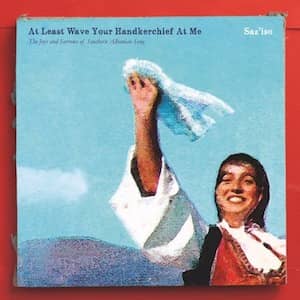 Saz’iso: At Least Wave Your Handkerchief At Me, The Joys And Sorrows Of Southern Albanian Song
Saz’iso: At Least Wave Your Handkerchief At Me, The Joys And Sorrows Of Southern Albanian Song
Glitterbeat – 13 October 2017
I thought that my collection of so-called “world music” was pretty extensive and wide-ranging, but closer inspection showed it to be sadly lacking in examples emanating from Albania, and totally devoid of Southern Albanian representation. This situation has now changed following the release of At Least Wave Your Handkerchief At Me…, and am I so glad that it has.
Unlike the music of the north, which is almost exclusively monophonic, Southern Albanian music tends to be polyphonic in nature, having its origins in the Epirus region at the time of the Ottoman Empire. The specific rules of this, originally a cappella, iso-polyphonic style dictate that the iso, or drone combines with at least two melodic vocal lines, the first, the ‘starter’, or lead/taker, and the second, cutter. When, thanks to the Tosk people, lutes began to take on the role of the drone and clarinets and violins the first and second voices, together with percussion, the naissance of Saze ensembles was assured.
Little known outside of the region, this form of music received some attention in 2011, thanks to Lucy Duran‘s BBC Radio 3 World Routes in Albania Series, (http://www.bbc.co.uk/programmes/b016vl5c), but is now set to garner even greater exposure thanks to this release from Glitterbeat records, together with a November 2017 tour.
Co-produced by Joe Boyd, (Pink Floyd,Taj Mahal, Nick Drake), and engineered by Gerry Boys, (Buena Vista Social Club), Saz’iso, the group which has been specifically assembled for this release, comprises virtuosi musicians and singers from the two great Saze towns of Përmet and Korça, with Donika Pecallari, Adrianna Thanou & Robert Tralo vocals, Aurel Qirjo violin & vocals, Telando Feto clarinet, Agron Murat lluatë/lute, Agron Nasi dajre/frame drum and Pëlumb Meta fyell/flute & vocal.
‘…The Joys And Sorrows Of Southern Albanian Song’ states the release’s title, and within the collection presented here funereal laments, songs of poverty and oppression, of fighting for one’s homeland and loss are well-represented, but then balanced with more uplifting and optimistic elements.
The opening track Tana, with its beguiling flute lines recounts the sad tale of a shepherd’s dying wish to play his flute before being dispatched by those robbing him of his flock. This serves as an ideal introduction to the complex melodies prevalent within this music style, with what are, at times, mournful and almost wild cries.
The sheer power of the female vocals, whether solo or trading lines is immense on both Trëndafili fletë-fletë and Doli Laceja nga stani, whilst with Goca e berberit the soaring female vibrato is countered by Orthodox priest Richard’s rich voice. At no time, however, do the vocals dominate the instrumentation, which is always given time and space to breathe, in keeping with the rules outlined above.
Boys yearning for girls is a common feature in songs around the world, and with Penxherenë e zotrisë sate, which contains lyrics contributing to the album’s title, ‘You keep going in and out of your gate. O poor me outside! At least wave your handkerchief at me.’ Southern Albania is able to make its own valued contribution. The raw emotion wrought from the lyrics through the vocal performance is palpitating as the song draws to its climax. Similarly, Nënockë, builds from a simple introduction to an almost hypnotic, trance-like conclusion.
The album is also well-served by instrumentals, with three folk dance tunes, two of which are upbeat and commonly performed at weddings, whilst the third, Valle e Osman Takës, is the accompaniment to a particularly difficult male-only dance, with sweeping violin parts.
Further instrumentals, Kaba me violinë and Kaba me klarinetë draw comparisons with both Western folk music and a doleful Middle Eastern style, and are examples of kaba, which legend suggests is a form of music created when a musician was told by his wife that he should not shed tears over her death but should play his clarinet over her body instead. Furthermore, with the voices melding together to produce a gorgeous sound and a whistful lute accompaniment, Fole moj mike një fjalë could almost be a Gallic lament. Two more tracks, Bëje dru në përcëllime and Avaz, were, to these ears, also reminiscent of Toureg blues, albeit with additional lute, flute, clarinet and violins and added to the unexpected pleasure that this album has brought.
On the evidence of the music presented here by Saz’iso, Saze as a musical form undoubtedly warrants a wider exposure and should stand alongside son, marimba, fado etc. as being part of every discerning music-lover’s collection. This release is a dish to be savoured.
Catch them live throughout November (dates below).
01 Nov – Cardiff | RWCMD
03 Nov – Bangor | Pontio
04 Nov – London | LSO St Luke’s
05 Nov – Milton Keynes | The Stables
06 Nov – Cambridge | Junction
07 Nov – York | NCEM
08 Nov – Bristol | Colston Hall /Lantern
09 Nov – Sheffield | University Concerts
10 Nov – Lincoln | Performing Arts Centre
11 Nov – Gateshead | Sage Gateshead
Order At Least Wave Your Handkerchief At Me via Amazon

